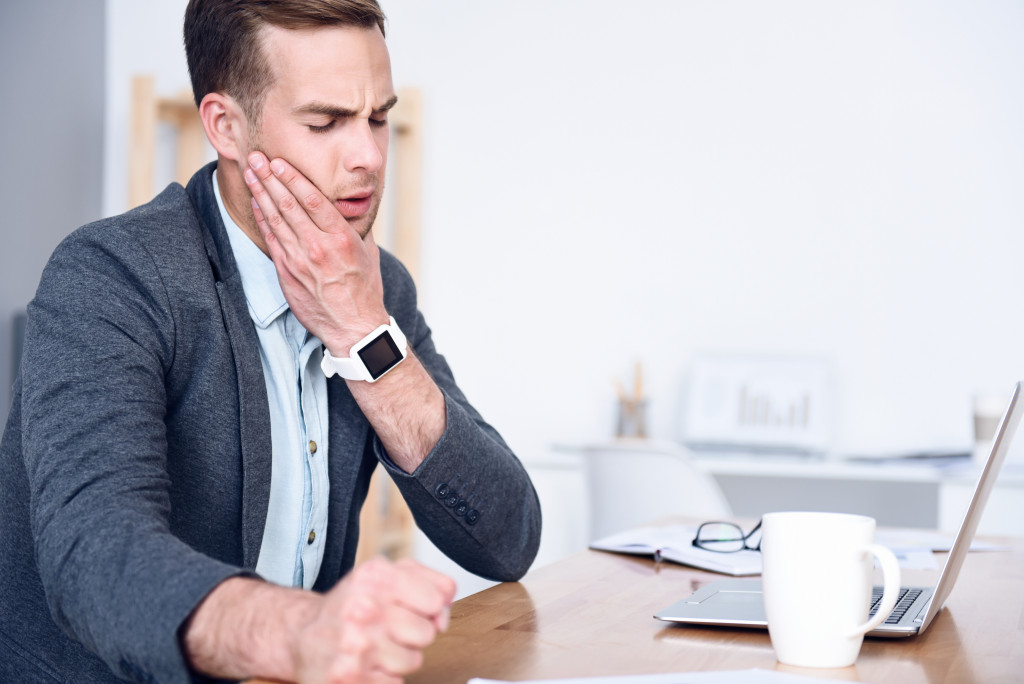Running is a great way to stay active and get in shape, but toothache while you run? Not so much. Tooth pain can be distracting, making it difficult to focus on your workout. If you’re experiencing toothache while running, don’t worry—there are some things you can do about it. Take a closer look at why this might be happening and what steps you can take to prevent it from occurring again.
Common Causes of Tooth Pain While Running
There are a few potential causes for this type of tooth pain. Here are some of the most common:
Bruxism
Bruxism is one of the most common causes of a toothache while running. This is because the force of your feet hitting the ground can cause the teeth to clench, resulting in pain. If you have bruxism, your teeth may become inflamed due to clenching or grinding them together when you run. This can cause the enamel on your teeth to wear down over time, eventually leading to pain and discomfort while running.
What to Do: If your tooth pain is caused by bruxism, you should consider wearing a mouthguard while running.Mouthguards act as a buffer between your upper and lower teeth, preventing them from grinding together. This can help reduce the pain associated with bruxism while running.
Tooth Decay

Another common cause of toothache while running is decay. Cavities can occur when bacteria build up on your teeth, leading to small holes in the enamel. The pressure of running can put extra strain on these areas, resulting in sharp pain. Additionally, sports drinks that contain sugar can contribute to tooth decay, as the sugar can help feed harmful bacteria that cause cavities.
What to Do: If you suspect your toothache is caused by decay, it’s important to see a dentist as soon as possible. Your tooth may be extracted and replaced with dental implants such as bridges or crowns to help restore your teeth and reduce the pain while running. Implants give your teeth a more natural look. They can help reduce the pressure on them when running and doing other activities.
Malocclusion
Malocclusion is another potential cause of toothache while running. This occurs when the jaw and teeth are misaligned, which can cause pain while running and in other activities involving jaw movement. When your jaw is misaligned, it can cause the teeth to rub against each other unnaturally, leading to toothache.
What to Do: If your toothache is caused by malocclusion, you may need to see an orthodontist for treatment. Orthodontists can help realign the jaw and teeth through braces or other devices such as headgear. This can help reduce the pain associated with malocclusion and make it easier to run without experiencing discomfort.
Gum Recession and Cavities
Gum recession and cavities are also potential causes of a toothache while running. Gum recession is a dental issue in which the gums recede from the surface of your teeth, leaving more exposed surfaces than usual. This can lead to sensitive areas on the exposed surface, which could cause pain when pressure is applied during exercise, such as running. Cavities are holes in the enamel that develop over time due to plaque buildup on the teeth. These can also cause pain when pressure is applied during exercise, like running.
What to Do: If you suspect your toothache is caused by gum recession or cavities, it’s important to see a dentist for treatment. Your dentist can fill cavities and recommend treatments to help protect your gums from further recession. This may involve using fluoride toothpaste, mouthwashes, and other products to help strengthen the enamel on your teeth.
Cracked Tooth
A cracked tooth gives bacteria a place to enter the tooth, which can lead to infection and, eventually, pain. Running puts extra strain on teeth due to vibrations from the impact of your feet hitting the ground, which can cause cracks in weakened or damaged teeth.
What to Do: If you suspect you have a cracked tooth, you must see a dentist for treatment. Your dentist can patch up the cracked tooth and help restore it to its original shape. They may use a dental filling or a crown to help protect the tooth from further damage. Also, it’s important to remember that a cracked tooth is especially vulnerable, so it’s best to avoid running until the problem has been resolved.
Toothache while running doesn’t have to ruin your active lifestyle! With proper preventive care and regular visits to the dentist, you should be able to get back out without worrying about painful dental issues getting between you and achieving your fitness goals. So don’t let toothache stop you from being active—take action today by visiting your dentist for an evaluation! With their help, you can find out what’s causing the pain and develop a plan for treating it so that, eventually, it won’t bother you anymore, even when running long distances.
